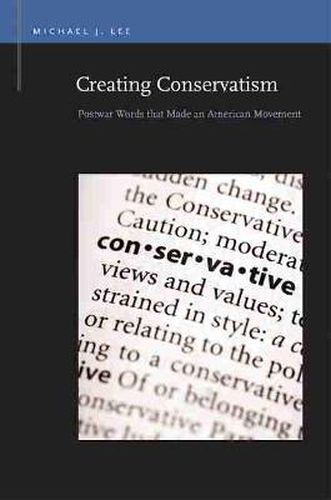Readings Newsletter
Become a Readings Member to make your shopping experience even easier.
Sign in or sign up for free!
You’re not far away from qualifying for FREE standard shipping within Australia
You’ve qualified for FREE standard shipping within Australia
The cart is loading…






Creating Conservatism charts the vital role of canonical post-World War II (1945-1964) books in generating, guiding, and sustaining conservatism as a political force in the United States. Dedicated conservatives have argued for decades that the conservative movement was a product of print, rather than a march, a protest, or a pivotal moment of persecution. The Road to Serfdom, Ideas Have Consequences, Witness, The Conservative Mind, God and Man at Yale, The Conscience of a Conservative, and other mid-century texts became influential not only among conservative office-holders, office-seekers, and well-heeled donors but also at dinner tables, school board meetings, and neighborhood reading groups. These books are remarkable both because they enumerated conservative political positions and because their memorable language demonstrated how to take those positions–functioning, in essence, as debate handbooks. Taking an expansive approach, the author documents the wide influence of the conservative canon on traditionalist and libertarian conservatives. By exploring the varied uses to which each founding text has been put from the Cold War to the culture wars, Creating Conservatism generates original insights about the struggle over what it means to think and speak conservatively in America.
$9.00 standard shipping within Australia
FREE standard shipping within Australia for orders over $100.00
Express & International shipping calculated at checkout
Creating Conservatism charts the vital role of canonical post-World War II (1945-1964) books in generating, guiding, and sustaining conservatism as a political force in the United States. Dedicated conservatives have argued for decades that the conservative movement was a product of print, rather than a march, a protest, or a pivotal moment of persecution. The Road to Serfdom, Ideas Have Consequences, Witness, The Conservative Mind, God and Man at Yale, The Conscience of a Conservative, and other mid-century texts became influential not only among conservative office-holders, office-seekers, and well-heeled donors but also at dinner tables, school board meetings, and neighborhood reading groups. These books are remarkable both because they enumerated conservative political positions and because their memorable language demonstrated how to take those positions–functioning, in essence, as debate handbooks. Taking an expansive approach, the author documents the wide influence of the conservative canon on traditionalist and libertarian conservatives. By exploring the varied uses to which each founding text has been put from the Cold War to the culture wars, Creating Conservatism generates original insights about the struggle over what it means to think and speak conservatively in America.